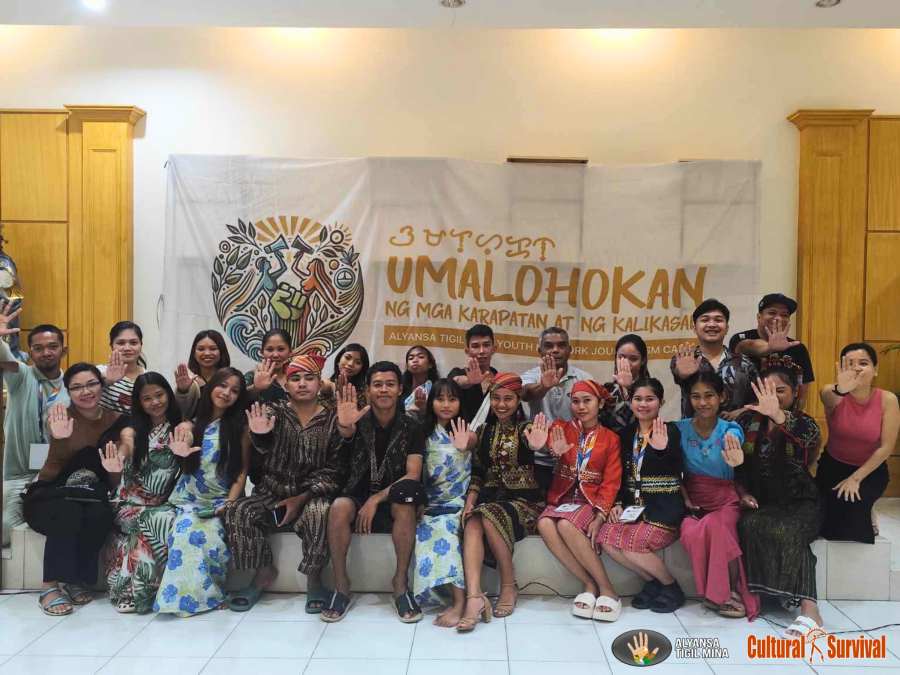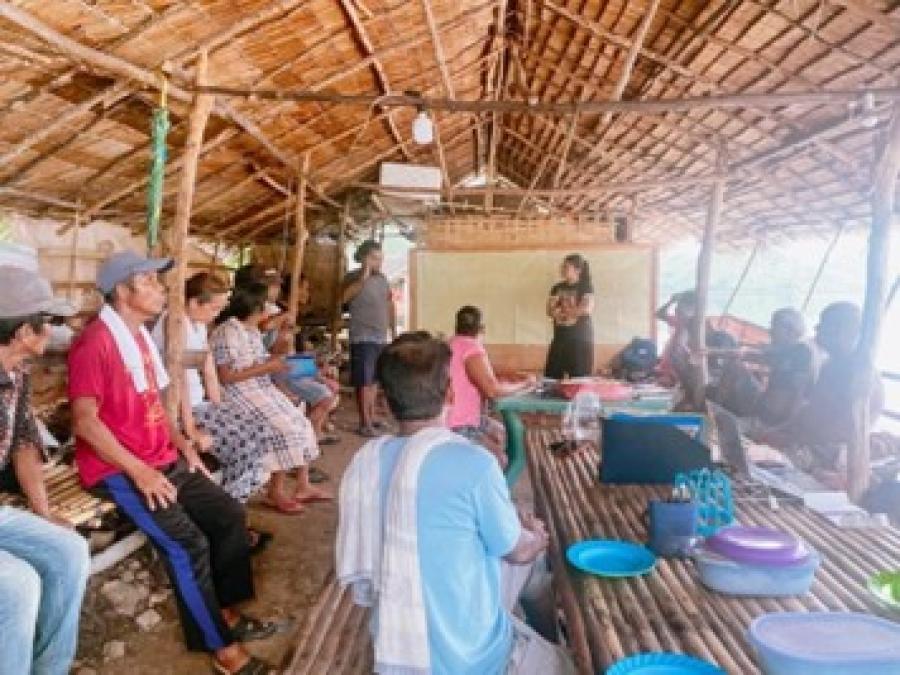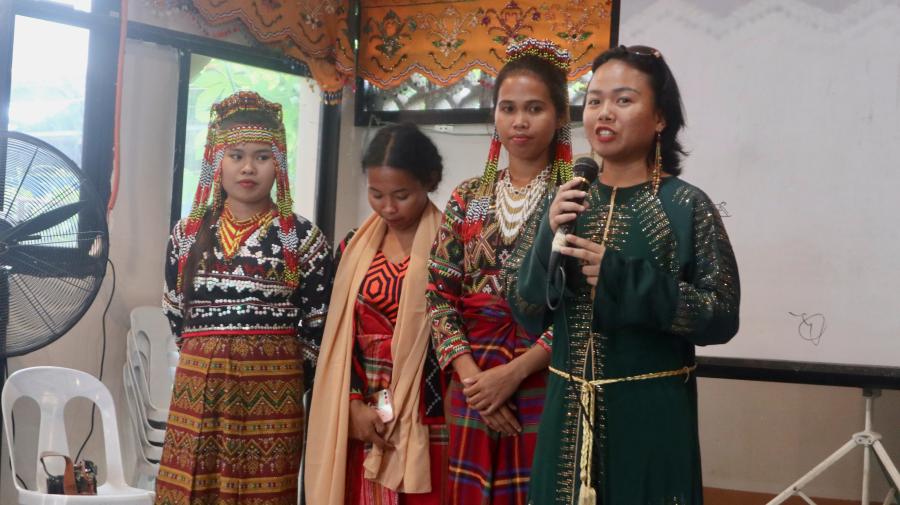A women's organization in the Philippines used an environmental campaign to create a worldwide trend that helps artisans compete in the global market.
Through their artisanal production, Philippine women have entered the global market on their own terms by forging links with alternative trade organizations (ATOs)-institutions that conduct business according to a philosophy of fair trade. Through such connections, these artisans have gained access to skills and product-development workshops as well as wider markets for their goods.
The Artists' Development Cooperative (ADC)1 makes a range of products from recycled plastic juice containers and provides local employment for urban poor women, including some indigenous migrants, in the inner-city Manila community of Pasig City.
The Philippine Setting
Workers in the Philippines face a shortage of formal sector employment. Government macroeconomic policies and structural adjustment initiatives instituted in the 1970s aggressively promote foreign investment and an outward-looking pattern of development. They have excluded self-employed women who previously enjoyed autonomy as traders and producers. As a result, poorer artisans became vulnerable to uncertain flows of aid and market conditions. Fair trade's potential lies in opening up international markets to these small community producers and educating consumers (particularly those in the North) to buy products produced and marketed ethically. Fair trade groups like ADC help to break patterns of dependency.
Nationally based ATOs in the Philippines such as the Associated Partners for Fairer Trade, Inc. (APFTI) and Community Crafts Association of the Philippines help producer groups market their products through international ATOs such as Ten Thousand Villages, Oxfam, and SERRV. They purchase goods at locally appropriate prices, regardless of a lower world commercial market price, and obtain products directly from producers to eliminate the layers of middlepeople and multiple markups. These sales enable producers to earn more than a subsistence livelihood, more accurately anticipate future income, and continue to work and live at home instead of leaving their communities. In addition, some ATOs provide services such as credit advances, skills training, and advice on product development. ATOs do not work to maximize shareholders'; profits, but rather to foster more democratic and equitable systems of international exchange.
Artists' Development Cooperative
In August 1997, the captain of a Manila barangay (neighborhood), with support from a Pasig City district councilperson, organized local homemakers into groups to collect non-biodegradable waste in support of the national government's "Clean and Green" campaign. In 1999, to formalize its expanded activities, the ADC registered with the Securities Employment Commission. In 2000, members established their own project to manufacture a range of carrying bags made from the recycled plastic juice containers they collected. Members subsequently established links with Manila-based APFTI to take advantage of their low-interest loans, skills workshops, and international market connections.
ADC's projects provide work for approximately 190 women who live within a 10-to-15-minute walk from the centrally located ADC workshop building. Working at ADC enables women to balance their domestic responsibilities with their income-generating activities. ADC provides artisans with the raw materials and women are paid for their labor in line with the Philippine government guidelines of 250 pesos a day or 1,250 pesos per week (U.S. $5 per day or U.S. $25 per week). Women work full time (eight hours a day) or have the option to work on a piecework basis. Piecework, most applicable to those women engaged in sewing, can pay women more than the regular full-time rate depending upon the number and type of bags they sew. The cooperative obtains orders from its customers for the type, size, and design of handbags, shoulder bags, and large tote bags- all of which contribute to the organization's current production of 40,000 bags per month. The growing popularity of these plastic juice-container bags has drawn regular clients from Japan, Korea, Canada, Australia, the United States, and Europe.
The rapid increase in the popularity of these recycled goods worldwide has led ADC to streamline its operations. Separate departments handle specialized stages of manufacturing. The challenge for ADC, like other ATOs, is to balance the success of its transnational business operations with support for its employees that is in line with fair trade philosophy.
Making a Living
All of the juice containers used in ADC's manufactured products are recycled. The used containers are first washed and dried and then sorted by color, brand name, and the type of fruit juice they contained. Following sorting, the bags travel to the sewing department where they are divided into subsections. One woman records the number of bags coming into the department and, following manufacturing, she records the number of finished products leaving the area; another group of women, the material controllers, distribute different sewing materials (bags, zippers, thread, and fasteners) to artisans. A group of sample makers or designers plan the specific patterns for the bags based on color, brand name, and sequence in which the containers are arranged. The designs are classified by whether they are simple or complex, as these criteria determine the piecework rate earned by the sewers.
Women engaged in sewing bags say that they can make approximately 40 to 50 bags a day if the design is simple and the bag is small; if the designs are intricate, women say they can make only 10 to 15 pieces a day. The rate of pay for the larger, more complex designs range from 40 to 60 pesos (about 70 cents to U.S. $1) per piece, while the rate for simple smaller bags is seven or eight pesos (about 12 to 14 cents) per piece. Sewers can earn from 300 to 500 pesos (about U.S. $5 to $9) a day- higher than the government's recommended 250-peso daily wage.
Working with fair trade organizations, however, does not insulate organizations like ADC from the discipline of global markets- delivery deadlines, communication and quality standards, and changing consumer tastes all have to be met. Fair trade organizations employ the same "just-in-time" rationale as commercial companies, in accordance with statutory trading regulations. Anthropologist David Lewis cautions that a key challenge in fair trade practice is to convert producers and their organizations into successful marketing operations with the ability to sell high quality goods in competitive, complex, and rapidly changing international markets. Thus, organ- izations like ADC devote as much time to social development as they do to working with ATOs to develop marketing strategies and educational campaigns aimed at increasing consumer support. Every Monday, for example, ADC holds discussion forums for employees to voice their problems or concerns. While these sessions give people a public and organized forum in which to speak, at the same time, they encourage employees to "buy into" organizational objectives.
As fair trade scholar Kimberly Grimes has written, further challenges for the fair trade movement include increasing sales in order to support the larger numbers of producers entering the movement and building coalitions with similarly mandated labor and environmental groups to educate a greater percentage of the population. Lewis agrees that strengthening cross-sector partnerships will involve greater transparency, market diversification, long-range planning, and the building of a set of realistic expectations. To this end, ADC has expanded its production lines to include footwear made from the same recycled juice containers, as well as jewelry fashioned from recycled waste paper collected by members. In addition, ADC managers, in their efforts to mentor artisans, encourage women to move horizontally or vertically across departments to raise their incomes and skill levels. The managers also encourage sewers to design new patterns and give them bonuses if the patterns are accepted as part of the product line.
Potential for Social Change
The current situation of ADC does not mean that exploitation could not surface in the future. Women working as management officers, for the most part, have college educations and have spouses who are employed, enabling them to attain middle-class (albeit lower middle-class) standing. Many cooperative members, however, are single mothers or have husbands who are unemployed. Although the cooperative encourages women to move vertically up to the level of department head, there have been few, if any, women who have risen from the rank of worker to that of manager. But given the youth of the program and the continuing challenge of expanding fair trade markets, managers are currently working to ensure sustainability by focusing on strengthening the organization's administrative structure and its connections to global markets.
Philippine women working in ADC show the challenges ATOs face in achieving equity and sustainability. As an alternative to the free-trade agenda, fair traders must balance their efforts to generate funds with those to promote the well-being of producers. The increasing popularity of ADC's products, along with a growing worldwide awareness of the fair trade movement, suggests that the work of these organizations is helping to change the consumption patterns of those in the North.
1. The name of this cooperative is a pseudonym.
B. Lynne Milgram is a professor of anthropology at the Ontario College of Art and Design in Toronto, Canada. Field research for this paper was conducted in the Philippines in 2000, 2004, and 2005. Financial support was provided by the Social Sciences and Humanities Research Council of Canada, Standard Research Grants, and by the Ontario College of Art and Design, Faculty Research Grants. In the Philippines, Milgram is affiliated with the Cordillera Studies Center at the University of the Philippines Baguio in Baguio City.
References and further reading
Chant, S. and McIlwaine, C. (1995). Women of a Lesser Cost: Female Labour, Foreign Exchangeand Philippine Development. London: Pluto Press.
Grimes, K. M. (2005). Changing the Rules of Trade with Global Partnerships: The Fair
Trade Movement. In Social Movements: an anthropological reader. Nash, J., Ed. Malden, Masachusetts and Oxford, U.K.: Blackwell Publishing. Pp 237-248.
Lewis, D. (1998). Non-governmental Organizations, Business and the Management of
Ambiguity: Case Studies from Nepal and Bangladesh. Nonprofit Management and Leadership 9:2, pp 135-152.
Milgram, B. L. (2000). Reorganizing Production for Global Markets: Women and Craft Cooperatives in Ifugao, Upland Philippines. In Artisans and Cooperatives: Developing Alternative Trade for the Global Economy. Grimes, K. and Milgram, L., Eds. Tuscon, Arizona: University of Arizona Press. Pp 107-128.
Singh, A. M. and Kelles-Viitanen, A., Eds. (1987). Invisible Hands: Women in Home-Based Production. London: Sage.
Whatmore, S. and Thorne, L. (1997). Nourishing Networks: Alternative Geographies of Food. In Globalising Food: Agrarian Questions and Global Restructuring. Goodman, D. and Watts, M., Eds. London and New York: Routledge. Pp 287-304.
Whatmore, S. and; Thorne, L. (1997). Nourishing Networks: Alternative Geographies of Food. In Globalising Food: Agrarian Questions and Global Restructuring. Goodman, D. and Watts, M., Eds. London and New York: Routledge. Pp 287-304.



